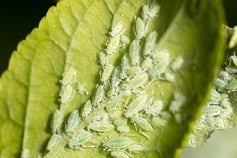
Aphids-whitefly-scale insects-thrips-mites-politicians all have some things in common: they're all parasites, sap-suckers, soft-bodied, entitled, often scaley, they usually hide in cracks or under things, and can be sorted with a light spray of DOCTOR PEST INSECTICIDAL SOAP!
Now these parasites seem to come out of nowhere in springtime, multiply up over summer, then fade out in winter. The reality is that these forkers are around all the time, even over winter. They, or their eggs, are hiding in plain sight somewhere on the plant, trunk, in the soil or close-by on branches and vegetation, or even in the basement of parliament. Ok well enough about politics; and my apologies to any aphids out there who might be offended by these insensitive thoughts!
SOLUTIONS
But seriously, there are a variety of solutions to these garden parasites, NOT including agrichemical poisons because you don't need that stuff for a healthy garden. You can start in WINTER with a dormant horticultural spraying oil to ferret these sap-suckers out. But that's if you can find them, because as mentioned above they could be hiding anywhere, not just on the dormant tree or plant. Our DOCTOR PEST INSECTICIDAL SOAP is based on horticultural oil, fused with plant-based castile soap - both of which will target over-wintering pests so in this sense can be used as a 'dormant oil'.
FROM SPRING these insects will slowly build up as they hatch and progress, then start feeding on your nice plants which seem to have - up to now - done nicely, using the spring flush, warmth and nutrients to take off and bloom. Then you may observe the plant starting to wilt, sag and become lifeless as these insects suck the living hell out of the plant, even leading to death. In the meantime, they'll spread over to other plants in your garden and continue the cycle through to autumn-winter.
WHAT TO DO?
A winter application is ideal in late September before leaves or flowers show signs of breaking dormancy; that is, before "bud break." A common mistake is to apply 'dormant' oil sprays too early (on the first warm day in August or September) before insects are actively respiring and susceptible to the oil's suffocating effects. Wait until as close to bud break as possible before applying oil sprays. For summer use, oils are effective against insects that are "soft and slow." Oils will not control late instar immatures or adult stages. Effective monitoring to discover pest populations in the early instar stage (ie: young larvae stage) will be necessary for effective control.
For adult pests and caterpillars use our DOCTOR PEST WHITE BUTTERFLY TERMINATOR as it has natural pyrethrum which is an organic bio-insecticide.
At the first sign of insect infestations you need to spray DOCTOR PEST INSECTICIDAL SOAP directly onto them. The formulation has CASTILE SOAP + HORTICULTURAL FISH OIL as the carrier; the oil acts like a sticker-spreader and increases the efficacy of the spray. The soap dries out their outer cuticle layer, dehydrating them, then they die!
Once it dries it has no residual effect on these insects, so any beneficial insects that land on the plant are fine. For a bad infestation then spray every 3-5 days, then extend that out to weekly or more once it's under control. A few insects are fine, a healthy thriving plant can cope with a few aphids. Just spray when they build up and it gets bad. Try not to apply the soap more than weekly if possible. Less is better.
SUMMARY
Finally, you may think that I'm totally biased, pushing our INSECTICIDAL SOAP onto you? Well of course I am, because this stuff actually works; it's organic based, safer and more natural than poisons and agrichemicals. Nature has provided a solution. I'm out in the garden most days and can see it working just fine. A light touch is the way to go.
Any nice comments? I welcome expertise and experiences from other organic gardeners!
Cheers Stephen


Add comment
Comments